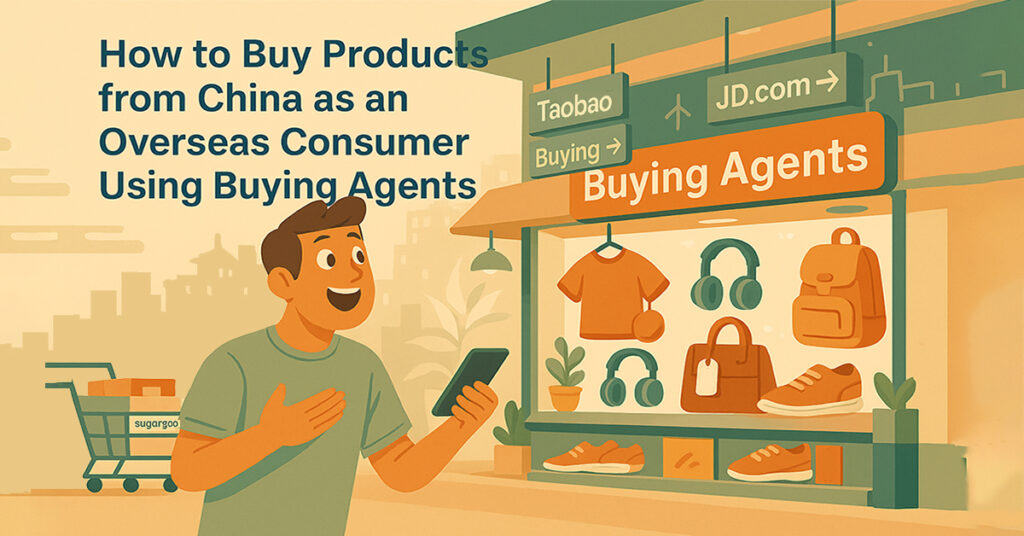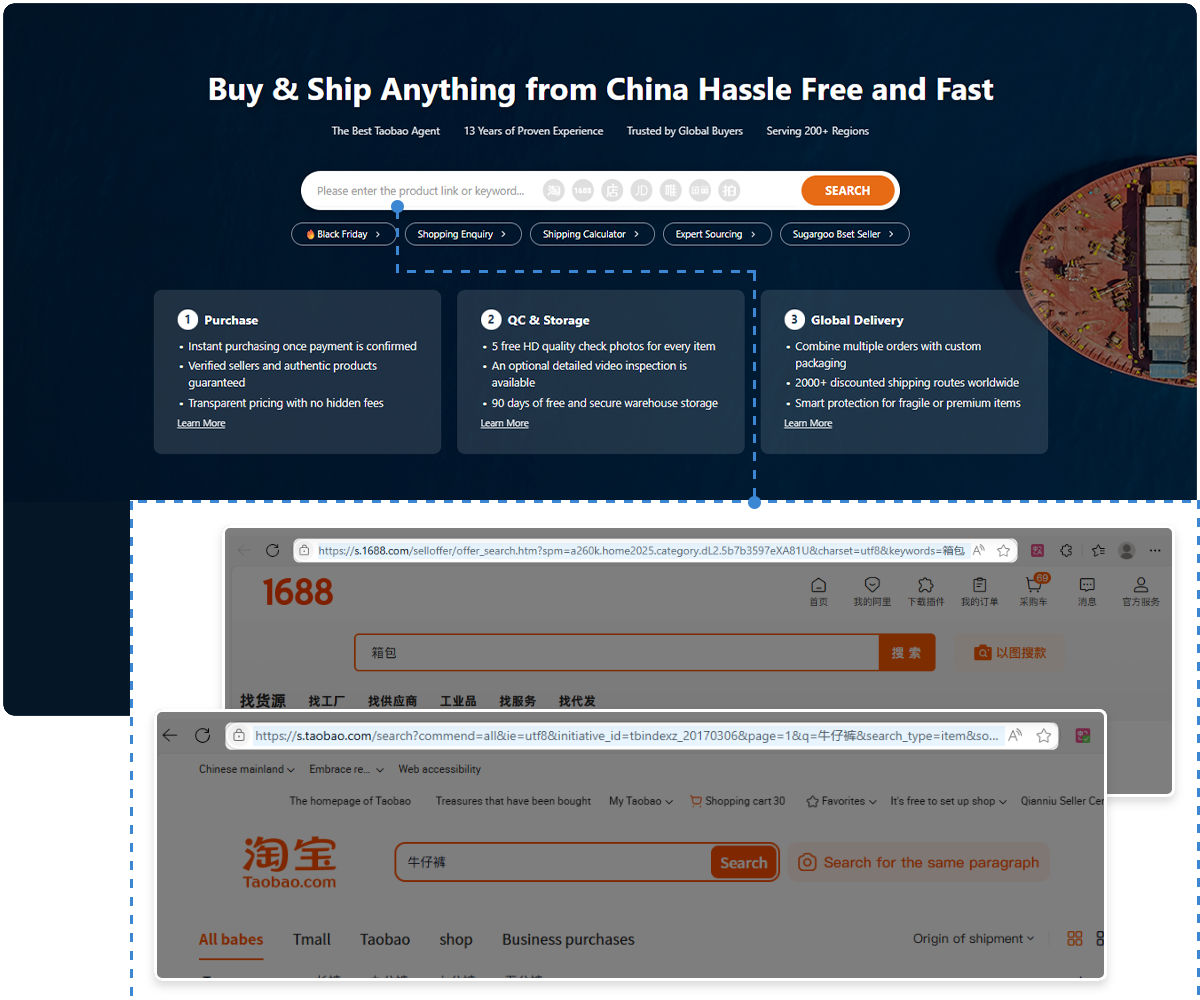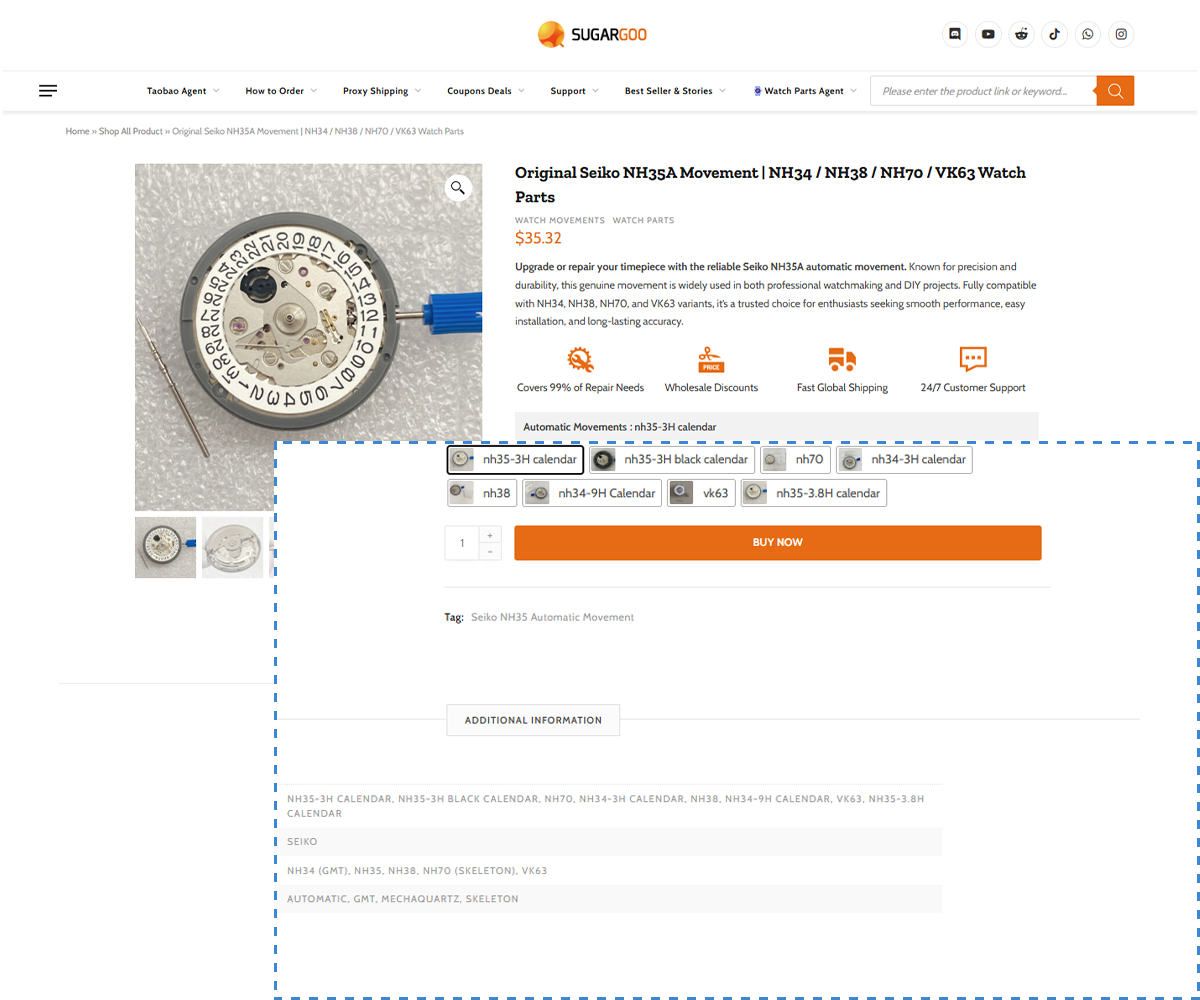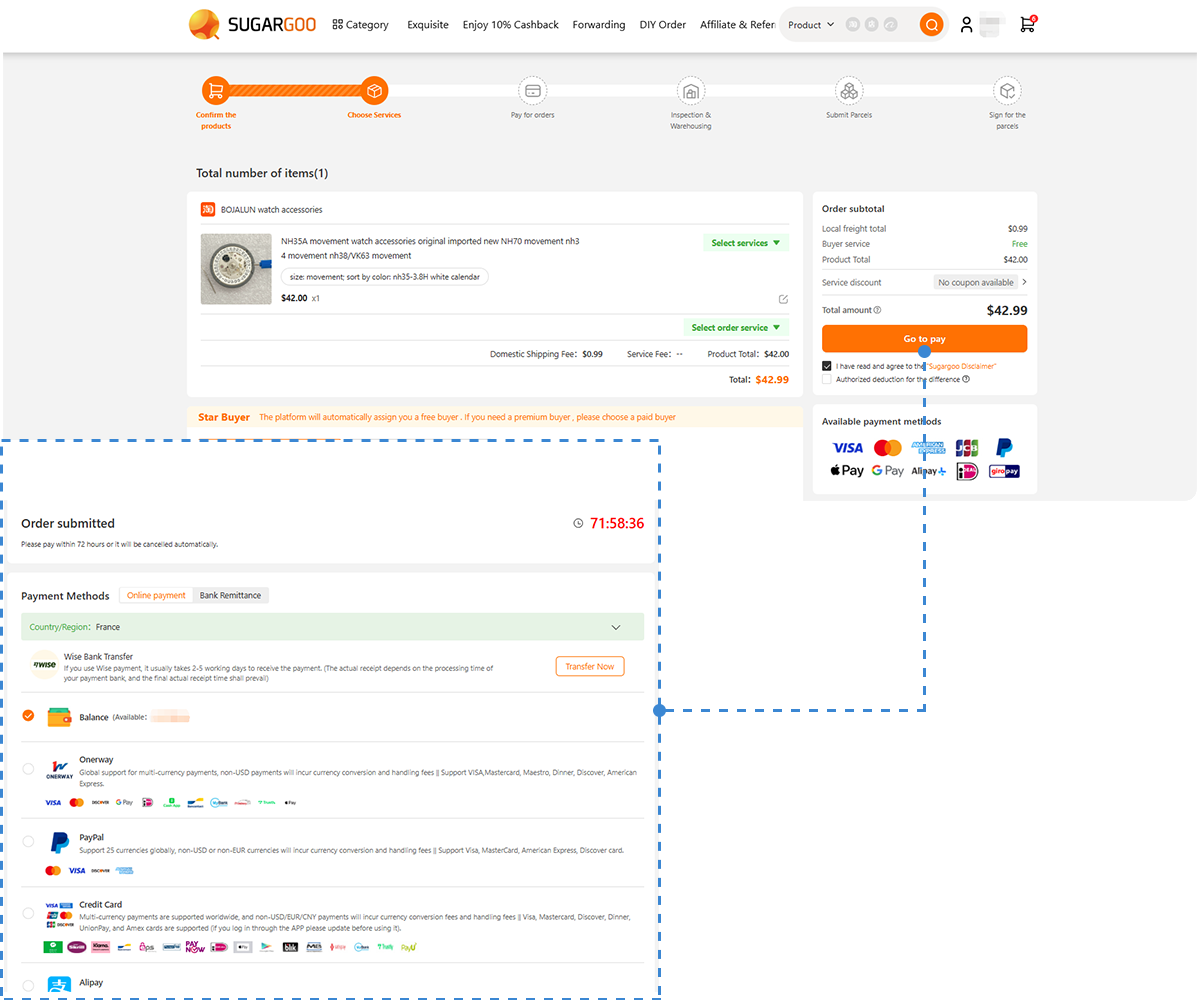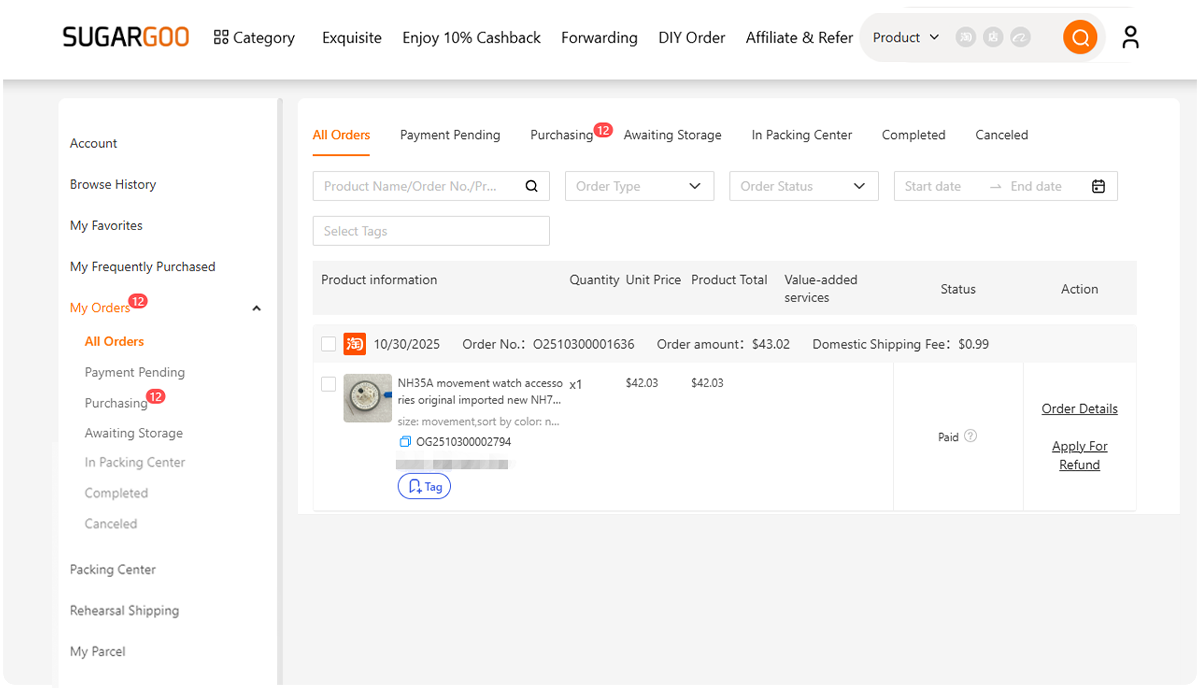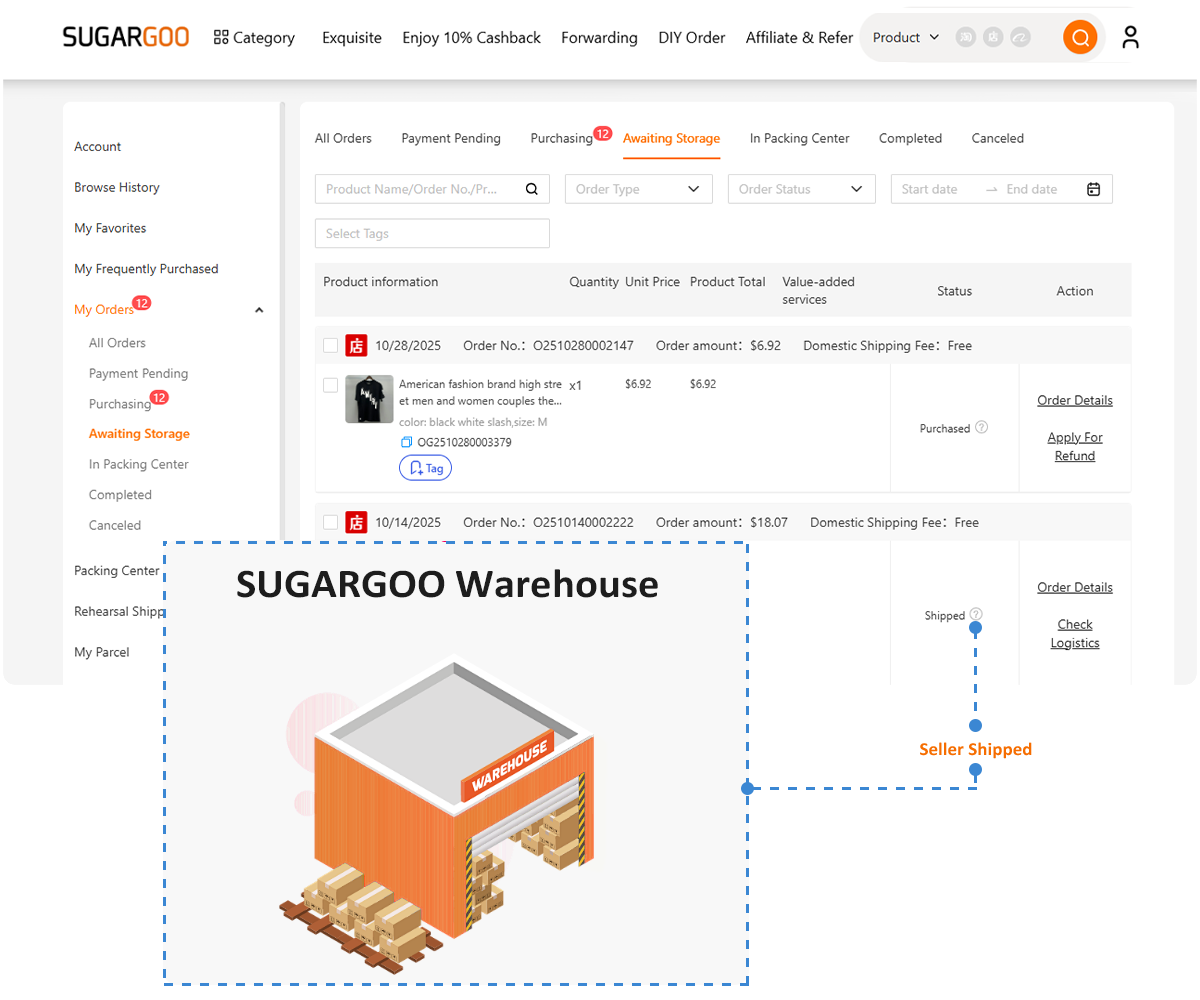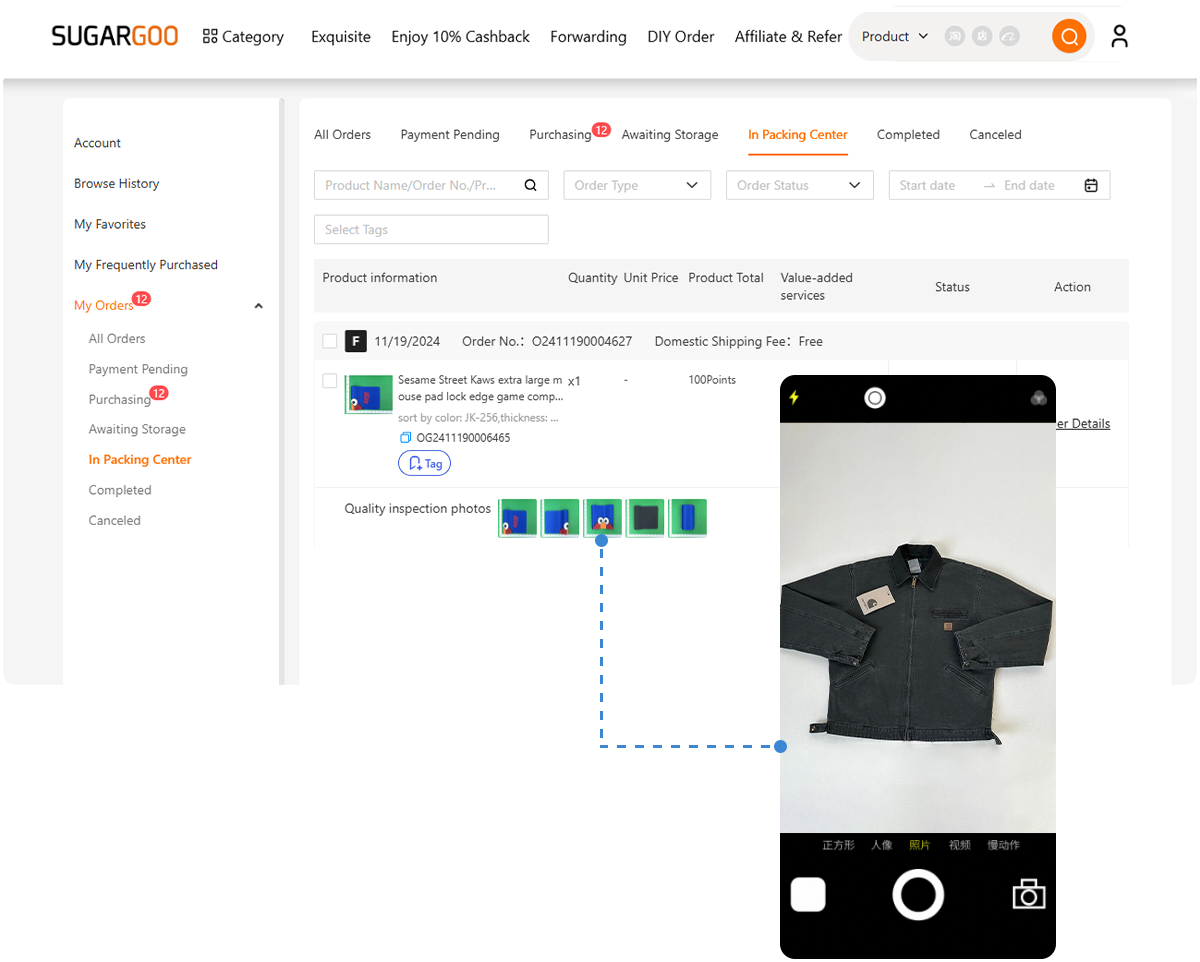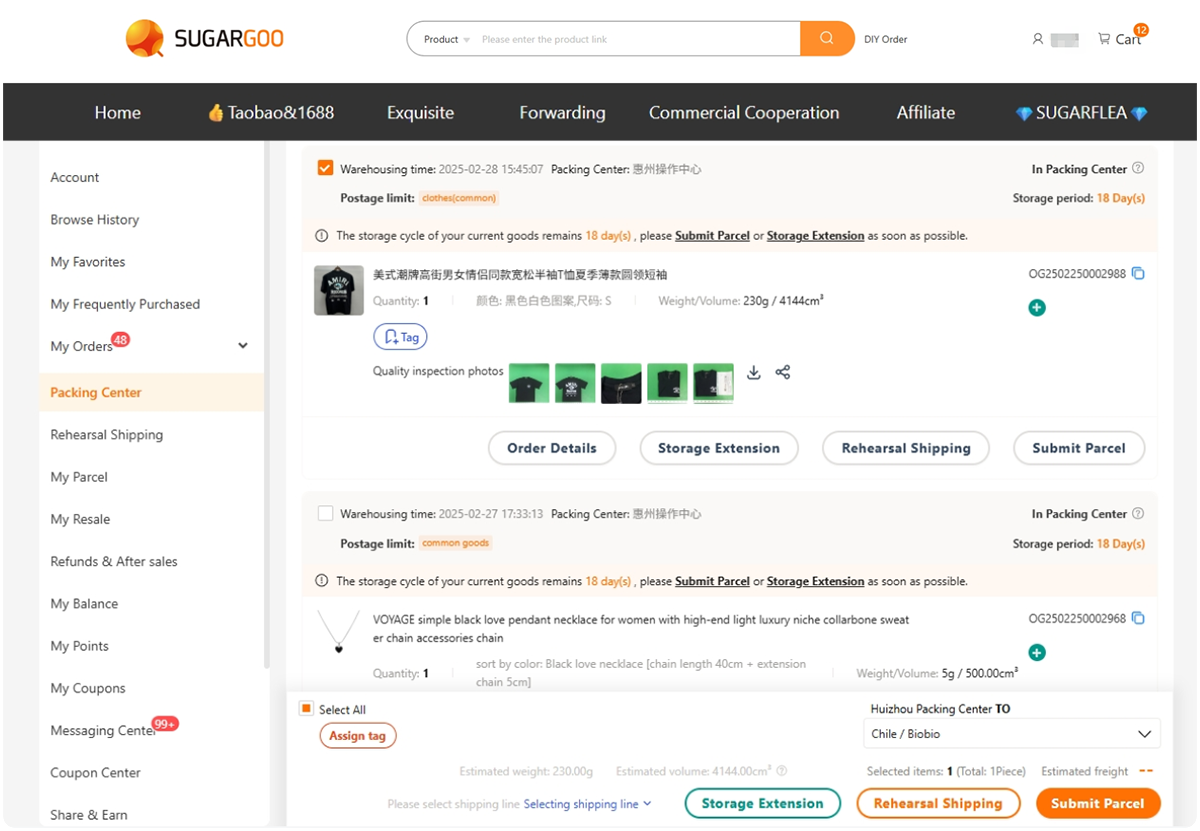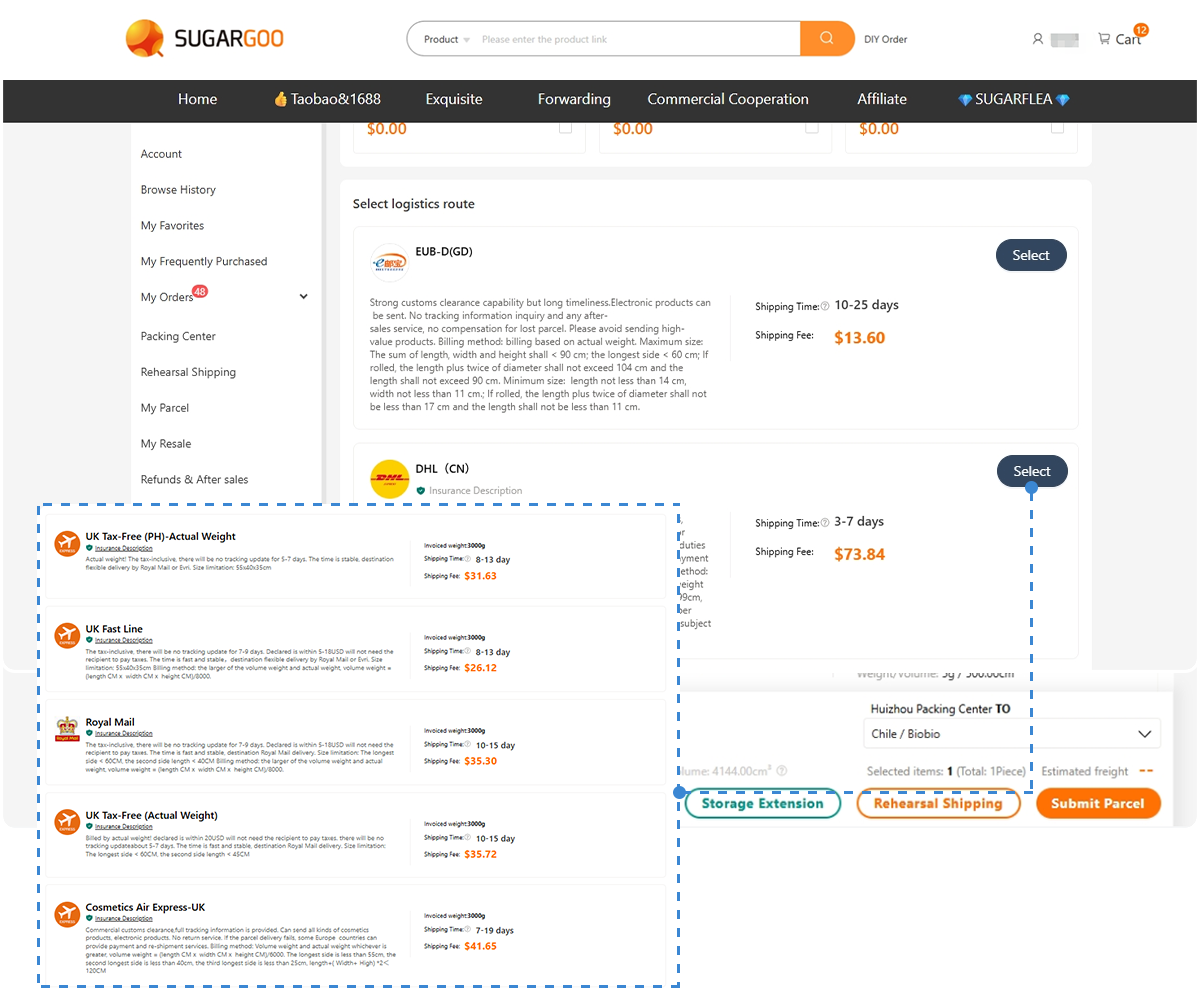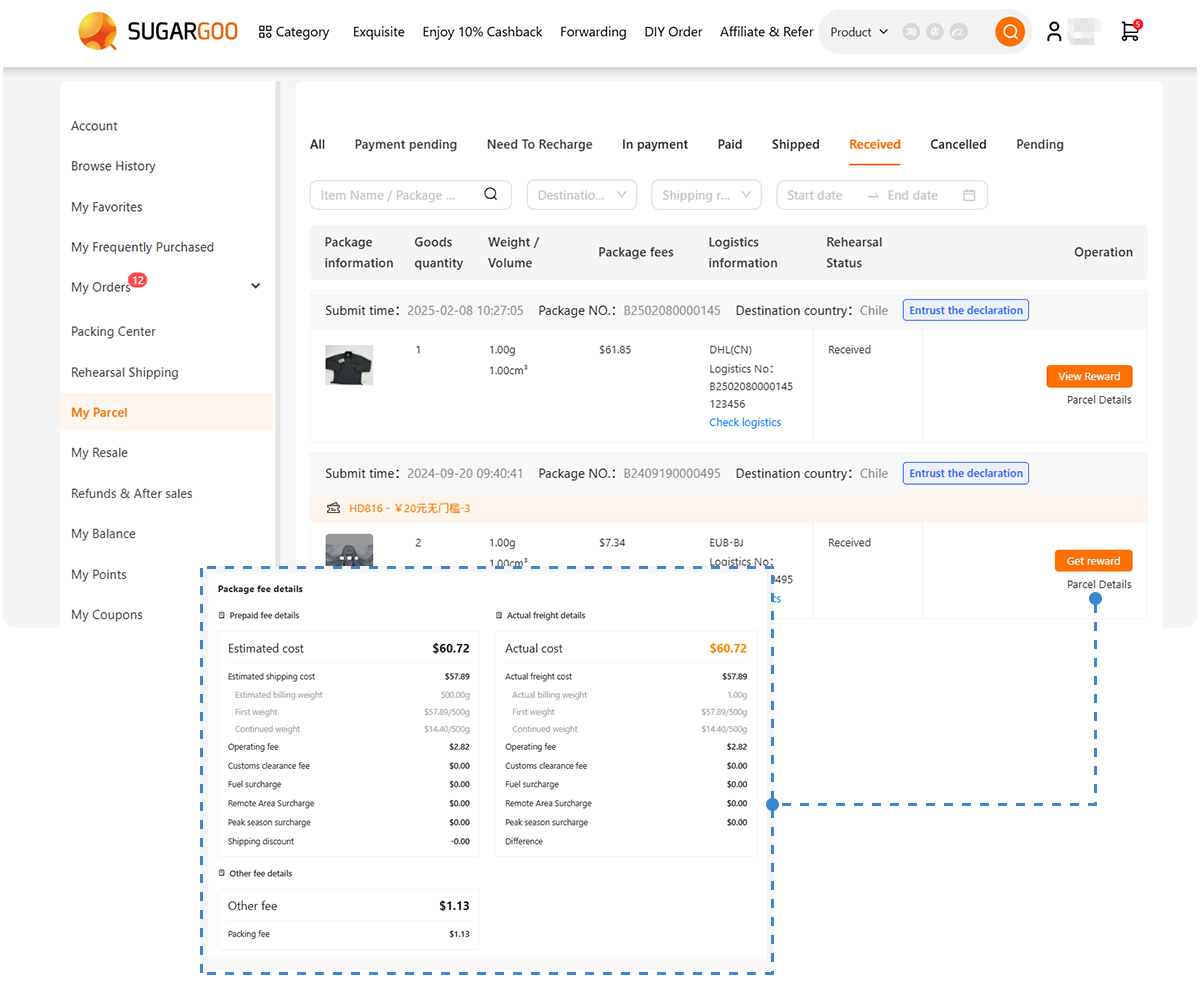Chinese e-commerce platforms like Taobao, JD.com, and 1688 are a treasure trove for global shoppers. These sites offer everything from trendy streetwear and K-pop merchandise to gadgets and home essentials – often at prices much lower than Western marketplaces. In short, the Chinese online shopping ecosystem is vast and full of opportunity for international buyers. However, if you’re outside mainland China, buying from China isn’t as simple as clicking “Buy Now.“Most Chinese platforms cater to domestic shoppers: the interfaces are in Chinese, payment methods are local-only, and many sellers don’t ship abroad. Language barriers, the need for a Chinese phone number or ID, and payment hurdles (Alipay, WeChat Pay, etc.) can all stand in your way. Shipping is another headache – many sellers ship only within China, and arranging international delivery yourself is costly and complex.
So, how can you tap into this shopping paradise without the pain? The answer is to use a China buying agent (also known as a Taobao agent or Chinese proxy shopping service). In this guide, we’ll explain what a buying agent is, why it’s the key to buying from China online hassle-free, and how to use one step-by-step. We’ll focus on using buying agents (instead of other routes like AliExpress), with Sugargoo – a recommended China buying agent – as an example solution. By the end, you’ll see how to buy stuff from China as an overseas consumer is totally doable (and even fun) with the right support.
Why Direct Shopping from China Is Challenging
Before we get into solutions, let’s quickly recap why buying directly from Chinese shopping sites can be difficult for foreigners:
- Language Barrier: Taobao, 1688, and most Chinese marketplaces are in Chinese. Product listings, buttons, and seller chats are usually not in English. This makes browsing and communication tricky if you don’t know Chinese. Machine translation can help, but it’s not perfect.
- Payment Issues: Chinese sites expect payment via local methods (like Alipay or WeChat Pay) tied to Chinese bank accounts. As a foreigner, you likely don’t have these. Many sellers don’t accept international credit cards or PayPal. Even if a site supports Visa/MasterCard, your bank might flag the foreign transaction.
- Shipping Limitations: Most sellers only ship within China. They assume a local address. A few may offer global shipping, but it’s rare and often expensive or slow. For instance, Taobao has a consolidated shipping program to certain countries, but it covers limited regions and can be complicated to navigate. If you try to buy directly, you might have to arrange a freight forwarder or beg the seller to mail overseas (not a simple task).
- Account and Verification: Some platforms require a Chinese phone number or ID for registration. Others might need a verified Alipay account. These requirements are hard to fulfill unless you live in China.
- Customer Support and Returns: Communicating with sellers (for questions, custom requests, or returns) is hard across the language barrier. If something goes wrong (wrong item, damage, etc.), resolving it from abroad can be daunting.
In short, the system isn’t built for overseas consumers. That’s where the buying agent method comes in.
What Is a China Buying Agent and How Can It Help?
A China buying agent is a service or company that acts as a middleman to help international shoppers purchase from Chinese online marketplaces. Think of them as your personal shopper in China. Instead of buying directly from a Taobao or 1688 seller, you buy through the agent. The agent will purchase the item on your behalf (using local payment), receive it at their Chinese warehouse, check it, and then ship it to you overseas.
Here’s what a good buying agent typically does for you:
- Provides a Local Chinese Address: When you order via an agent, you can use the agent’s warehouse address in China as the shipping destination for sellers. Sellers ship domestically to the agent’s warehouse, so you do not need a Chinese address.
- Handles Payment in RMB: The agent accepts your payment in a convenient method for you (often credit card, or Western payment options) and then pays the seller in Chinese Yuan. This bypasses the need for you to juggle currency exchange or Chinese banking. For example, Sugargoo allows you to pay via card or Alipay, then pays the Taobao seller on your behalf.
- Language and Communication: The agent’s platform is usually in English (or multiple languages), making it easy to search and order items without knowing Chinese. If any issues arise (item options, stock questions), the agent’s customer service can communicate with the seller in Chinese for you. Essentially, the agent bridges the language gap.
- Quality Check and Photos: Many agents will do a basic inspection of items when they arrive at their warehouse. They may take photos of the goods and upload them to your account, so you can verify the item looks correct before shipping internationally. This helps ensure you get what you paid for and can catch any obvious issues (wrong color, damaged item, etc.) early.
- Storage and Consolidation: The agent can store your purchases (often free for a certain period, e.g., Sugargoo offers free storage for 100 days) in their warehouse. This means you can buy from multiple sellers over time and then ship everything together in one box. Consolidating packages saves a lot on international shipping costs, instead of getting 5 separate packages from 5 sellers. The agent will combine your items into one shipment when you’re ready.
- International Shipping Arrangements: Once you’re ready to ship, the agent offers various international shipping methods (couriers like DHL/FedEx, EMS, airmail, etc.). You can choose based on speed and cost. The agent handles the paperwork, labels, and dispatch. They’ll provide a tracking number for your parcel. Essentially, they are a one-stop logistics solution – you don’t have to figure out how to ship from China; they do it routinely.
- Customs Assistance: While you are responsible for any customs duties, agents often help by correctly declaring packages and providing necessary invoices or documentation. They can also advise if an item is likely to cause customs issues (e.g., batteries or restricted items) and help you choose appropriate shipping to minimize problems.
In essence, a China buying agent like Sugargoo makes buying from China online as easy as shopping on a local e-commerce site. You browse and place an order on the agent’s website (or app) in English, pay normally, and the agent takes care of the rest. No Chinese address, no Chinese bank, no translating chats with sellers – the agent has you covered.
Is there a catch or extra cost? Agents do charge service fees (usually a small percentage of the item price or a flat fee). However, this fee often is worth it considering the convenience and access you gain. Also, items on Chinese sites are so cheap that even after fees and international shipping, you often still save money or get products not available elsewhere. Later, we’ll discuss cost considerations and tips to keep fees down.
Why Use a Buying Agent Instead of Other Methods?
You might wonder, why not use alternatives like AliExpress, Amazon, or eBay to get Chinese goods? Those platforms do exist and are easy for foreigners to use. However, using a buying agent opens up the full Chinese market:
- Access to All Products: Many items on Taobao/Tmall or 1688 (a wholesale marketplace) are not listed on AliExpress or other global sites. Chinese domestic platforms have the widest variety – niche hobby items, latest fashion, etc. Using an agent means you’re not limited to what sellers choose to list internationally; you can buy almost anything listed in China.
- Lower Prices: Products are often cheaper on the domestic sites. For example, the same phone case might be $2 on Taobao but $5 on AliExpress (as sellers mark up for international buyers). By purchasing domestically through an agent, you often get the lower local price. Even after paying agent fees, you might come out ahead.
- Bulk/Wholesale Buying: If you want to buy in bulk or wholesale quantities, 1688.com is a go-to platform in China, but it’s only in Chinese and for domestic trade. An agent lets you use 1688 for factory-direct bulk deals. This is great if you are a small business or just want a dozen of something for a group buy. You wouldn’t have that option easily without a local contact or agent.
- Trust and Safety: Platforms like AliExpress are straightforward, but you’re still dealing directly with overseas sellers one-on-one. With a reputable agent, you have an extra layer of accountability – the agent checks the goods and can help resolve issues. If something arrives broken to the agent, you can often get help arranging a return or refund with the seller through the agent, before it ships overseas to you. The agent has a reputation to maintain and assists in dispute resolution, making the process feel safer for newbies.
- Shipping Consolidation: Buying 5 items on AliExpress means paying 5 separate international shipping fees. Buying 5 items via an agent means you pay one international shipping charge for a single combined parcel. This can result in major savings, especially if you’re buying many small items.
- One-stop Convenience: Perhaps the biggest reason is convenience. Once you learn to use an agent’s website, you can access multiple Chinese shopping websites in one place. For instance, with Sugargoo, you can paste links from Taobao, Tmall, JD.com, 1688, Weidian, and more – and handle all those purchases in one unified cart. No juggling multiple accounts or worrying about which site ships overseas. The agent is your central hub for buying stuff from China.
In summary, while you can use other methods in some cases (AliExpress for a limited selection, or direct if a seller ships worldwide), a China buying agent is the most versatile and powerful method to truly shop the breadth of China’s e-commerce. It’s particularly useful for the vast Taobao/Tmall marketplace and for getting the best deals.
Fun fact: Even many seasoned importers and dropshippers use buying agents or proxy services to source from China because it streamlines their workflow. So, you’re in good company!
Step-by-Step: How to Buy from China Using a Buying Agent
Let’s walk through the typical process of using a buying agent to buy from China. The exact interfaces differ by agent, but the overall steps are similar. In each step, we’ll use Sugargoo as an example of how it works:
Step 1: Browse Chinese Websites for Products
Start by finding what you want to buy. You can go to Chinese shopping sites like Taobao.com, 1688.com, JD.com, etc., and look for your item. Even if you can’t read Chinese, there are tricks: use Google Chrome’s translate feature on the webpage, or search for the item in English plus the word “Taobao” on Google to find relevant links. Many international shoppers do this to discover Taobao listings.
Alternatively, some agents (Sugargoo included) have an English search function on their own site. For instance, you can search keywords on Sugargoo’s platform, and it will show results from Taobao in English. This is convenient, though sometimes using Taobao’s site directly (with translation) can yield more comprehensive results.
When browsing, keep in mind: check product details (sizes, specs, etc.), look at seller ratings or number of sales if visible (higher sales and good ratings suggest a reliable seller), and note the price in RMB. If there’s a domestic shipping cost listed to send to the warehouse, note that too. Tip: If you’re not sure about an item’s details (like does a shoe come with the box? is an electronic device compatible with your country’s voltage?), you can plan to ask the agent later – they can often inquire with the seller on your behalf.
Once you find the exact item you want, copy the product link (URL) from the Chinese site. You’ll need this in the next step. If you plan to buy multiple items, copy all those links or keep the pages open.
Step 2: Sign Up on the Buying Agent‘s Website
If you haven’t already, register for an account on the buying agent’s website. Registration is usually straightforward (email and password). Using Sugargoo as an example, the site is in English, and signing up is free. Once logged in, you’ll get access to a dashboard or account page.
Most agents have a section where you can submit a link or search for a product. On Sugargoo, right on the homepage, there’s a bar to paste the URL of a product from Taobao, Tmall, JD, etc. Paste the link you copied, and the agent site will load the item’s details (price, images, variants) on their interface. You can then select options (size, color, quantity) just like a normal e-commerce site.
Step 3: Place an Order via the Agent
Add the item to your cart on the agent’s website. If you have multiple items (even from different Chinese sites), you can usually add them all to the agent’s cart. When you’re ready, proceed to checkout.
At checkout, you’ll typically pay for: the item cost (in RMB, but the agent will show you the converted amount in your currency or USD), plus any agent service fee. Agent fees vary; some charge 5-10% of the item price, others a flat fee of a few dollars. Sugargoo, for example, often runs promotions with 0% service fee for certain user levels or has a low fee structure, but assumes there might be a small fee. You’ll see the breakdown before paying.
Choose a payment method that the agent accepts. Common ones: PayPal, credit/debit card, Wise transfer, etc. One convenient method is to recharge your account balance on the agent site (similar to adding funds to a wallet) and then pay from that balance, which can save on multiple small PayPal transaction fees if you do many orders. It’s up to you; for a first-timer, using PayPal or a card directly is easiest.
Submit the order and complete the payment. The agent will now purchase the items on your behalf. This usually happens within minutes to a few hours during business hours. They will pay the Chinese seller, fill in their warehouse address for delivery, and the status in your account will update to something like “Purchased” or “Waiting for Seller to Ship.”
Step 4: Wait for Items to Arrive at the Warehouse
Now, patience! The domestic shipping from the seller to the agent’s warehouse typically takes a few days (often 2-5 days within China, though it could be more if the seller is far or there are holidays). In your agent account, you’ll see updates when the seller ships. E.g., it might say “In transit to warehouse.”Once delivered, the agent will update the status to “Arrived” or “Stored.”
At this point, many agents do a quality check. Sugargoo and others often provide photos: you might see pictures of your items in the warehouse, so you can verify they look correct. Check these photos in your account – it’s exciting to see your haul, and you can confirm, for instance, the color/size matches what you ordered. If there’s any issue (e.g., the warehouse notes damage or a wrong item), you can contact the agent support to help resolve the issue with the seller (this might involve a return or exchange, though that can add time).
If you ordered from multiple sellers, you can wait until all your items have arrived at the warehouse. Agents usually offer free storage for a certain number of days (90 days, 100 days, etc.), so you have time to accumulate items. Take advantage of that to consolidate shipping.
Step 5: Consolidate and Ship Internationally
Once you’re ready to have everything forwarded to you, it’s time to ship. In your agent account, select the items you want to ship and “submit a parcel” or “request shipment.” You’ll be asked to confirm the destination address (your address abroad) and choose a shipping method.
This part is important: agents will list various shipping options like EMS (Postal service), Air Parcel, DHL, FedEx, UPS, special lines (e.g., dedicated lines to certain countries), etc. The prices will vary by speed and weight. You might see cheap options that take longer (e.g., ePacket or SAL mail taking 2-4 weeks) and expensive ones that are express (DHL could be 3-7 days). The agent’s system will typically show you an estimated cost for each based on the weight of your consolidated package.
Choose the option that fits your budget and urgency. For example, if you bought low-value items or you’re not in a rush, a slower postal route can be very cost-effective. If you bought something urgent or valuable (like a pricey gadget), you might opt for a faster courier with better tracking. Sugargoo and other big agents often have discounted rates with major couriers, so you might be surprised that shipping 5kg by air isn’t as expensive as you thought.
Before finalizing, you can often add package services: like extra protective packaging (bubble wrap, waterproofing), insurance, or removing shoeboxes to reduce weight. These are optional, but consider them for fragile or valuable items. A few dollars on bubble wrap can save a broken item later.
Now, pay for the international shipping. This is usually a separate payment from the item order. The agent might let you pay via your balance, PayPal, or card again. After payment, the agent will package up your items into one box (consolidate them) and prepare them for shipment. They’ll then hand it over to the shipping carrier you chose.
Step 6: Track and Receive
Once shipped, your agent will provide a tracking number. You can use this on the carrier’s website or sometimes directly track through the agent’s site. Now it’s just the waiting game for the package to travel from China to you. Depending on the method, you’ll see scans as it departs China, clears customs in your country, and goes out for delivery.
When the package arrives, you receive your goods – success! Don’t be alarmed if you see a lot of Chinese tape and labels on the box; that’s normal for an overseas package. Carefully open and enjoy your haul.
A quick note: customs duties or import taxes – if your package value is above your country’s duty-free threshold, you might need to pay taxes on delivery. This isn’t the agent’s doing, but general import law. For example, in some countries, anything above $800 is taxed; others have lower limits. Be aware of your local rules. Often, smaller packages slide through with no issues, but larger shipments might incur a fee. The delivery courier will bill you if so (sometimes online or at your door). This is just part of buying from overseas. If you’re unsure, you can ask the agent to mark a reasonable value or split into two parcels to stay under limits (though we encourage honesty in declarations).
And that’s the process! The first time might feel complex, but buying from China through a Taobao agent quickly becomes second-nature. Next, we’ll cover some tips to maximize your success and minimize any hiccups.
Tips for a Smooth Experience When Buying from China
To help you make the most of shopping via a China buying agent, keep these tips and best practices in mind:
- Compare Sellers and Products: Chinese marketplaces often have multiple sellers offering similar items. Do a bit of comparison before you commit. Check if one seller’s price is significantly lower – it could be a red flag for quality. Look at seller ratings (even if you can’t read reviews, the number of transactions and stars can indicate trustworthiness). Choosing a reputable seller will increase the likelihood of a smooth transaction.
- Mind the Sizing (for Fashion): Asian sizes run smaller on average. If you’re buying clothes or shoes, always check the size chart in the product description. Don’t just assume an “XL” on Taobao equals an “XL” in the US or EU. Use cm/inches provided. You can convert measurements or use tools (Sugargoo has a handy size converter in their interface). For shoes, be sure of the EUR/US size conversion. When in doubt, you can message the agent to verify sizing with the seller. Taking this step will save you from receiving an awesome jacket that unfortunately doesn’t fit!
- Check Item Details and Options: Use browser translation to read item specifics. Look at photos closely. Make sure you select the correct variant (color, model, etc.) when adding to cart. If something isn’t clear – for example, the listing shows multiple styles or bundles – add a note to the agent when ordering, specifying what you want. They will communicate it to the seller. It’s better to give too much instruction than too little.
- Watch the Weight (Shipping Costs): International shipping cost is usually based on weight (and sometimes volume). A pro tip is to be mindful of very heavy or bulky items. An item might be cheap in China (say, a $10 large decorative lamp), but if it weighs 5kg, shipping could cost far more than the item. Use your agent’s shipping calculator (most have one on their site) to estimate the cost for heavy items before you buy, to avoid any surprises. Sometimes, splitting your haul into two boxes might avoid hitting a pricey weight tier. Or removing retail packaging can reduce weight. Plan strategically to save on shipping when buying stuff from China.
- Know Restricted Items: Most everyday products are fine to ship, but some categories are restricted in international shipping or by customs. Common problem items include: batteries, power banks, liquids, flammable items, perishables, and any kind of weapon or replica weapon. Also, counterfeit branded items can be seized by customs in many countries (and are illegal to import). Your agent can advise if something is likely to be an issue – Sugargoo, for example, will flag if an item is prohibited or requires special shipping. Ultimately, it’s your responsibility to comply with your country’s import laws. When in doubt, do a quick check of your country’s import restrictions or ask the agent.
- Consider Insurance for High-Value Shipments: If you’re ordering something expensive (e.g., a smartphone or designer item) or fragile (like glassware), it’s wise to opt for insurance and extra padding. Many agents offer insurance at a small percentage of the item’s value, which can reimburse you if the package is lost or heavily damaged. While losses are rare, shipping halfway across the world has inherent risks – insurance buys peace of mind. Likewise, you can usually request extra bubble wrap or a wooden crate for fragile goods. Spending a few dollars more on protective packaging is worth it to ensure your new China goodies arrive intact.
- Take Advantage of Consolidation and Storage: We mentioned it before, but it’s a big money-saver: consolidate multiple orders into one shipment whenever possible. If you’re shopping over a period of weeks, you can accumulate items in the agent’s warehouse (often free for 2-3 months) and send them together. This drastically reduces the per-item shipping cost. For example, shipping one item might cost $20, but shipping five items together might cost $30 total (instead of $100 if done separately). Just keep track of the free storage time; if you need more time, agents typically allow extensions for a fee, but most people don’t need that unless waiting for pre-orders or custom-made items.
- Stay Communicative: Keep an eye on your agent account dashboard or emails for updates. Sometimes the agent might need to contact you – for instance, if a seller is out of stock or a color is unavailable. Respond promptly so they can proceed with your order without delay. Similarly, if you have concerns or questions at any stage, reach out to the agent’s customer service. Good agents like Sugargoo have responsive support (via email, chat, or even Discord communities). Remember, they’re there to help make buying from China online easy for you. Don’t be shy about asking questions or requesting help.
- Join the Community: If you plan to be a frequent China shopper, consider joining online communities of fellow buyers. There are subreddits (like r/FashionReps, r/taobaoagents) and Discord servers where people discuss finds, agent experiences, and tips. Sugargoo, for example, has an active Reddit and Discord presence. You can learn a lot from others – from how to spot good quality items to which shipping method is fastest to your region. It’s not required, but community knowledge can enhance your shopping savvy (and it’s fun to share hauls!).
By following these tips, you’ll avoid common pitfalls and have a smooth experience purchasing from China. Now, let’s address some of the frequently asked questions new shoppers often have about using China buying agents.
Frequently Asked Questions (FAQ)
How can I buy from China online if I live overseas?
A: The simplest way to buy from China online as an overseas consumer is to use an international-friendly platform or a proxy buying service. Many people wonder how to buy things from China or search terms like “how to buy stuff from China online“– the answer is usually to go through a middleman who has a foothold in China. In practice, you have two main routes:
- Use a China buying agent service (like Sugargoo, Superbuy, Pandabuy, etc.). This lets you access domestic Chinese e-commerce sites (Taobao, JD, 1688, etc.) via the agent. You find the product you want and tell the agent to buy it for you. They handle everything as described above and ship to you. This is ideal for the full range of products.
- Use an international marketplace that ships from China (like AliExpress, DHgate, or LightInTheBox). These sites are tailored for global buyers – you can pay directly, and sellers will ship overseas. However, they carry only a subset of the products, often at slightly higher prices to account for the added hassle the seller takes on.
For most shoppers looking for variety and deals, the buying agent method is the way to go. It might seem daunting at first, but agents make it feel like you’re shopping on a regular website in your own language. You don’t need a Chinese address or bank account – just place an order and let the agent do the heavy lifting.
(In short: to purchase goods from China as a foreigner, either use a service like Sugargoo to access local Chinese sites, or buy from global-facing Chinese sites like AliExpress. The former gives you more options and often better prices.)
Where can I buy things from China? What are the best sites?
A: The best places to buy Chinese products are the big Chinese online marketplaces, typically requiring a buying agent for full access. Here are the top platforms:
- Taobao.com – China’s largest online marketplace (owned by Alibaba). It’s like eBay/Amazon combined, with millions of sellers offering everything under the sun. Great for retail quantities of all sorts of goods. For example, Taobao is often considered the best website to buy clothes from China due to its gigantic selection and cheap prices. (Taobao is in Chinese, so international users almost always use an agent or Taobao’s own limited international app).
- Tmall.com – A sister site to Taobao, but focused on brand-name and official stores. If you want authentic products from recognized brands (Nike, Apple, etc.), Tmall is the go-to. Prices are retail (not bargain basement), but you get guaranteed genuineness. Many Tmall sellers are also on Taobao, and agents can buy from Tmall as easily as from Taobao.
- 1688.com – A wholesale marketplace (also under Alibaba) meant for business-to-business trade. Think of it as the Chinese domestic version of Alibaba.com. It has factory-direct products, usually sold in bulk packs or with minimum order quantities. Prices per unit can be extremely low. This is great if you want, say, 50 custom keychains or 100 t-shirts for a group/event. Even if you’re not a business, you can use 1688 via an agent to get bulk deals. (Sugargoo, for instance, has guides on how to buy from 1688 via a buying agent for those interested in wholesale.)
- JD.com (Jingdong) – One of China’s largest e-commerce companies, akin to Amazon. JD is known for electronics and quality assurance. Many products are sold directly by JD or authorized vendors, so counterfeits are low. They have fast local shipping (not that it matters for you overseas) and a reputation for authenticity. You can find genuine tech gadgets, appliances, and even luxury items here, often at good prices. Agents can help you buy from JD easily. (We have a separate guide on buying from JD.com with an agent if you need specifics.)
- Other Apps (Pinduoduo, Weidian, Xiaohongshu, etc.): China’s e-commerce landscape is home to numerous niche platforms. Pinduoduo is known for ultra-cheap group buy deals. Weidian and Xianyu are used for second-hand or niche community sales (popular for streetwear resales, fan merchandise, etc.). Xiaohongshu (Red) is like Instagram-meets-shopping, often with influencers selling items. These usually require a Chinese app and ID to use directly, but agents can often purchase items from these platforms if you provide a link or details. So really, you can buy from almost any Chinese platform via an agent.
If you prefer not to use an agent at all, the main sites to stick to would be AliExpress.com (a global site where many Chinese merchants list products for direct sale abroad) or Shein.com (for fashion). There are also Amazon and eBay, where Chinese sellers list items. But again, the selection and prices on those global platforms are just the tip of the iceberg compared to what’s on domestic sites. Using a buying agent unlocks the full catalog of Chinese goods.
(For more details on choosing between these platforms, check out our Taobao vs JD vs 1688 comparison guide, which breaks down what each site is best for.)
Do I need a Chinese address, phone number, or bank account?
A: No – that’s the beauty of using a buying agent. The agent provides the Chinese shipping address for you (their warehouse). They also handle payments to sellers through their own local methods. You, as an overseas buyer, just deal with the agent’s website, which is set up for international use. You’ll sign up with your email, and pay the agent with a normal credit card or PayPal in your currency.
There’s no need for a Chinese phone number or ID on your part. The agent’s own business credentials basically stand in for yours in the transaction with the seller. For example, if a site requires real-name verification (some Chinese sites do for big orders), the agent will handle that. You just might need to provide your name and address for the final delivery.
So, even though Chinese marketplaces themselves aren’t foreigner-friendly, a buying agent makes it so you, as an overseas consumer, can shop without any Chinese contact info or bank. This is one of the main reasons to use an agent. It removes those logistical barriers entirely.
(If you try to buy direct, you’d hit those verification roadblocks; with an agent, you won’t.)
Is using a Chinese buying agent safe and legit?
A: Yes – as long as you use a reputable buying agent, it’s a safe and common practice. Buying agents have been around for many years and serve thousands of international shoppers. They make money by providing a service, and it’s in their interest to handle your orders properly so you continue using them and spread the word.
That said, do your homework on the agent you choose. Big names like Sugargoo, Superbuy, Wegobuy, Pandabuy, Yoybuy, etc. have established reputations and online reviews. These companies have websites with secure payment systems (always look for HTTPS and use known payment methods). If an agent has active communities, customer support, and clear policies, that’s a good sign. You can even start with a small test order to build trust.
The process is legit – you are hiring the agent to act on your behalf. It’s somewhat analogous to using a freight forwarder or a concierge service. Thousands of people worldwide use Taobao agents to get everything from street fashion to collectibles. Of course, exercise normal caution: if a deal seems too good to be true, it might be; and understand that the agent can’t 100% guarantee the authenticity of every product (you should choose sellers wisely). But generally, with an agent’s oversight (quality checks, etc.), it’s safer than buying blind on your own.
Financially, if you use PayPal or a credit card, you also have some buyer protection through those platforms. Some agents offer refunds or compensation if something goes wrong under their watch (e.g., if they purchased the wrong item by mistake). Check the agent’s terms, but rest assured that the major agents wouldn’t have lasted in business if they were scamming people. They operate on trust.
How much does it cost to use a buying agent (and is it worth it)?
A: The costs involved when using a buying agent typically include:
- Product price: The base price of the item in China (often pleasantly cheap!).
- Domestic shipping: The seller’s cost to ship the item within China to the agent’s warehouse. Sometimes free, sometimes a few RMB (the agent will add this to your order total if applicable).
- Agent service fee: A commission for the agent. This might be 5-10% of the item price, or a flat fee like $1-5 per item, depending on the agent’s model. Some agents have VIP tiers that reduce this fee, or promotions that waive it for certain orders.
- International shipping: The cost to send the consolidated package from the agent to you. This is usually the biggest chunk of the cost if the items are heavy or if you choose express shipping. It’s calculated by weight/size and the method you choose.
- Optional extras: e.g., insurance, special packaging, or additional quality inspection requests.
Whether it’s “worth it” depends on what you’re buying and how you value the savings or access. Often, even after adding agent fees and shipping, you can save 30-50% versus buying similar products locally or on AliExpress. For instance, perhaps you buy 3 pairs of shoes at $20 each from Taobao (total $60), pay the agent $6 fee (10%), and $30 for shipping – $96 all-in. Those 3 pairs might have cost $50 each ($150 total) if bought from a Western retailer or AliExpress. So you saved ~$50 and got exactly what you wanted. Plus, some things aren’t available outside China at all, so the value is in getting the item in the first place.
To minimize cost: consolidate shipments (one 5kg parcel is cheaper than five 1kg parcels), look for agents with low fees (Sugargoo often has competitive shipping discounts), and choose an economical shipping option if time isn’t critical. Keep an eye on package weight – a lighter haul will obviously be cheaper to ship.
In our experience, for anything except very low-value single items, using an agent pays off with the deals you get. If you’re buying a single $2 trinket, it wouldn’t make sense (shipping will be $15+). But who buys just one thing? The magic is in doing a haul of multiple goodies. Many users treat it like an event – they plan a haul, gather items over weeks, then get a big package of joy. 😃
How to buy goods directly from China without an agent?
A: This question comes up occasionally – essentially, can I bypass the agent and buy directly? The honest answer is that it’s possible but challenging for the average person. Here are the only ways to “buy direct” without using an intermediary:
- Find a seller who personally ships overseas: You could try contacting a Taobao seller via the AliWangwang chat (in Chinese) and ask if they will ship to your country. If they agree, you’d need to arrange payment (maybe a manual PayPal transfer) and hope they send it. This is very case-by-case and not something most sellers do routinely. Essentially, you turn the individual seller into your “agent,” but with none of the infrastructure or support.
- Use Alibaba for bulk orders: If you are doing a business-sized purchase, you can use Alibaba.com (the global site) to request quotes from manufacturers and suppliers. They will often handle international transactions for large orders. But this is more for wholesale and not for buying single consumer items.
- Travel to China or have a friend there: The most direct method – go shopping in China yourself or have a buddy buy and mail stuff to you. Obviously, this is only feasible in special situations.
For everyday consumers, these routes are impractical. That’s why buying agents exist – to make the process smooth and scalable for one-off purchases or small hauls. They handle the messy parts like communications, payments, and logistics.
So yes, you could theoretically avoid using an agent, but you might end up spending significantly more effort and potentially cost than it’s worth. Most people quickly realize the small agent fee is a very fair trade-off for the convenience and security you get. Buying direct from China without any intermediary is not the norm for a reason – it’s just too complicated in most cases. Using a trusted service is the smart way to go for 99% of overseas shoppers.
Which China buying agent should I use?
A: There are several popular buying agents out there, and the “best” can depend on your needs (cost, interface, specific features). Without a doubt, Sugargoo is one of the highly recommended options, especially for newcomers. Sugargoo offers a user-friendly website in English, supports all the major Chinese shopping sites, and has transparent fees. It provides helpful features like a shipping cost calculator, size conversion tool, and even 100 days of free storage for your items. Many users praise Sugargoo’s customer service and fast responses if any issues arise.
Other well-known agents include Superbuy, Pandabuy, Wegobuy, and Yoybuy, among others. They each have their pros and cons (some have slightly lower shipping in certain routes, others have more active community forums, etc.). But as a beginner, you can’t go wrong starting with Sugargoo as a reliable all-in-one agent. It’s focused on international consumers and continually updates features catering to overseas shoppers.
(We’ve mentioned Sugargoo throughout this article because we’ve had good experiences with it, and it’s a partner in making Chinese shopping accessible. Feel free to try out a couple of agents to see which interface and service you prefer. But do check out how to buy from Taobao using Sugargoo for a detailed walkthrough on that platform – you might find it covers all you need.)
Final Thoughts
For global consumers in the awareness and consideration stage of buying from China, the process can seem intimidating at first. But hopefully this guide has demystified it. Using a China buying agent like Sugargoo truly opens the doors to an entire world of products and deals that were previously out of reach. You no longer have to stick to local stores or marked-up import prices – you can go straight to the source (with a little help from your agent friend).
To recap, Chinese marketplaces offer an incredible variety of goods at ultra-competitive prices, but they’re not built for direct overseas shopping. Buying agents bridge that gap, handling the “how to buy goods from China“part for you behind the scenes. You get the fun of discovering cool items and the satisfaction of getting them delivered to your doorstep, without the usual headaches.
If you were curious about how to buy stuff from China and are hesitant due to the logistics, consider this your sign to give it a try. Many people are amazed at how smoothly their first agent-assisted purchase goes – it can even become a hobby (unboxing a haul from China is like Christmas morning!). Just remember to start small, follow the tips we provided, and choose a reputable agent.
Ready to shop the world‘s biggest marketplaces? With the buying agent method, you’re just a few clicks away from bargains and unique finds. So go ahead and explore Taobao or 1688, and when you see that must-have item, you’ll know exactly how to get it. Happy shopping, and may your overseas hauls be ever in your favor!
(P.S. Still have questions or need more guidance? Don’t worry – we have plenty more resources on our site. Be sure to check out related guides like how to buy from Taobao using Sugargoo , and our FAQ sections in other articles for deeper dives into specific topics. Buying from China is a journey, and we’re here to help you every step of the way.)
